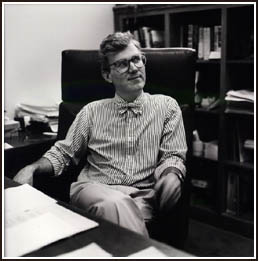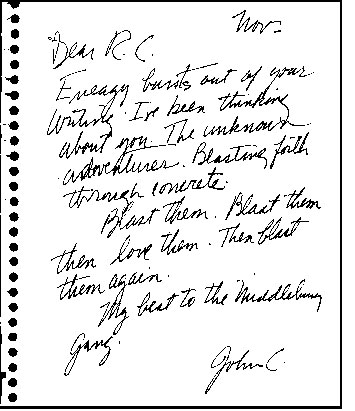Ray
Carney was interviewed by Devon Dickau for an article in the UCLA Daily
Bruin about the value of majoring in film production in college. The
text follows.
To read an
essay about the academic value of Film Studies programs, click
here.
To read more
reflections on the meaning and purpose of film school, click
here.
To read Andrei Tarkovsky's thoughts about Film School, click here.
To read Werner Herzog's thoughts about film school, click here.
To read a mini-essay on why students who are serious about actually creating art that stands a chance of reaching others might want to consider switching from film to writing, click here.
Click
here for best printing of text
A
Modest Proposal:
Let’s Replace Film Production Programs
with Majors in Auto Mechanics
(At least majors would be able to get jobs...)
 I gather you have some issues
with the way filmmaking is taught in our universities. I gather you have some issues
with the way filmmaking is taught in our universities.
An undergraduate degree is
only eight semesters, and a master’s degree usually only four, so the
basic question is whether studying film as an undergrad or grad student
is the best possible use of that terribly short period of time before
you are forced to enter the work force and cut your values to fit. I don’t
think it is. The student years are a magic time in your life – the one
time you can free yourself from the pressures of having to hold a job
and make money and devote yourself purely and totally to developing your
heart, mind, and soul. It’s a shame to spend most of it learning how to
load a camera, run a tape recorder, and work an Avid. There are much better,
much deeper, much more spiritually rewarding things to do with those semesters.
Why doesn’t majoring in
filmmaking contribute to your development as much as anything else you
might study?
 There
is virtually no intellectual content to the courses. It’s like learning
to be an auto mechanic or a plumber or a carpenter. You’re not going to
college, you’re going to trade school. There
is virtually no intellectual content to the courses. It’s like learning
to be an auto mechanic or a plumber or a carpenter. You’re not going to
college, you’re going to trade school.
What do you learn? How to shoot
and edit a movie. Is that worth tens of thousands in tuition dollars?
Is that the best use of your time at that point in your life? Anyway,
you can learn the technical stuff on your own. In a couple months in the
summer as an apprentice to an indie filmmaker, you could learn everything
you need to know to make a movie. It’s really not that hard. Film schools
make it seem difficult to keep themselves in business. Particularly nowadays
with the availability of cheap, portable film and video equipment, there’s
less reason than ever for film school.
What do you mean when you
say film school makes filmmaking seem difficult?
They mystify it by emphasizing
the technical side: the use of expensive equipment, the absurd over–emphasis
on lighting, focus, exposure, sound mixing, postproduction, special effects.
Technical things are not that important. Look at Jay Rosenblatt’s work.
Look at Andrew Bujalski’s. Look at Cassavetes’. The emphasis on technique
has created a generation of filmmakers who know everything about making
movies except what makes a movie any good. It’s why almost none of the
most important American independent filmmakers of the past fifty years
went to film school. They taught themselves everything they needed to
know.
How can you compare being
a filmmaker with being a carpenter or auto mechanic?
I’m not equating the end results. I’m equating the course content. If filmmaking were taught as part of a comprehensive, philosophical, arts and culture curriculum, it would have intellectual depth and substance. But it’s not taught that way. It’s taught like carpentry. You learn a lot of mechanical skills that are not that different from learning to be a plumber. The only difference I can see is that if you got a degree in plumbing you’d be able to get a job after you graduate! (Laughs) Sorry. I guess that’s not funny if you’re a film major. The overwhelming majority of film majors, at both the graduate and undergraduate levels, are no longer involved with film in any capacity five years after they graduate. Jobs, particularly creative ones, in the film world are next–to–impossible to get. These students spend two or four years learning a narrow set of skills they stop using within a short time after they graduate. 
The next question would be why don’t we have majors in plumbing or carpentry? The answer is because it wouldn’t be intellectually defensible. That’s obvious, I think. We can all agree that that would turn going into college into a joke. What if the science curriculum dropped all the intellectual side of science, all the thinking courses, and simply trained people to be lab technicians? That’s the equivalent to what film majors actually learn at both the undergrad and graduate levels at many film schools. They don’t learn to think; they don’t learn to master complex systems of knowledge; they don’t learn the history of an art; they learn a skill – how to light and focus and edit a movie.
College should be about learning to think, not learning a trade. Half the problems in the world come from the fact that people are unable or afraid to think. New ideas scare them. New ways of thinking and feeling threaten them. That's why we have terrorists, stupid politicians in the White House, and bigots of every sort. Because they never learned to think, because anything different from themselves makes them mad. Turning college into vocational training only contributes to what's wrong with the world. Its one more way of not giving students a liberal education.
| As a touch of comic relief, I'd note that this interview (and its posting here) was one of the main reasons Boston University administrators and College of Communication film and television professors voted to censure me and attempted to force me to remove this entire web site from the university server. Click here to read the whole knock-down, drag-out drama. -- Ray Carney |
The problem is that people don’t see how narrow and trivial devoting your time to majoring in film production is because film is this “sexy,” “rock star” field with movie stars and press coverage and awards. But, if you subtract out the Hollywood glitz and money and press releases, you’d realize that what a student actually learns in a production program – how to load a camera, how to set the exposure, how edit the footage, etc. etc.– doesn’t have any more intellectual content – or value – than learning how to be a lab technician – or an auto mechanic.
I’m speaking from experience. I hear this all the time from students in my own program at Boston University. And it’s always the best students, the more thoughtful ones. They tell me they feel like they are in a vocational training program – the kind they avoided in high school. They are hungry for ideas, for intellectual discussions, for debates about moral issues, but all they get in their production classes is “that scene is badly lighted” or “the ending needs to be speeded up.” If we were talking about carburetors, instead of cans of film, we’d see what a waste of someone’s time and spirit – not to mention tuition dollars – that is.
What do you say to them?
I tell the unhappiest ones to change their majors to music, art, literature, history, philosophy, biology, chemistry, or something else with more intellectual substance, something where they will be learning the history and philosophy of a field of inquiry. They will have an opportunity to discuss philosophical and moral issues. And, as an added benefit, in terms of transferring to another arts program, they will then be exposed to the supreme expressions of the human spirit - not sitting in the dark viewing junky Hollywood movies.
| A note from Ray Carney: For a good laugh (or cry) read the reply I wrote to Daniel halfway down on Mailbag page 115 (or click here to go directly to the relevant section of the page) to see my colleagues' response to the preceding statement. As one of them put it, with direct reference to the preceding statement, to try to help students in this way was "taking food out of my baby's mouth!" In other words, in attempting to help students find a deeper and more fulfilling major, I was cutting into the enrollment of film and television courses in my department. I was saying what should never be said, doing what should never be done. I was formally censured in a unanimous vote of my department colleagues and my web site was threatened with being taken down in response. |
At least a production program
gives you access to equipment and facilities you wouldn’t normally have.
 And
the day you graduate, and actually want to use it to make a real movie
– a feature–length documentary or narrative – you cease to have access
to any of it! They lock you out. They change the password. (Laughs) And
the day you graduate, and actually want to use it to make a real movie
– a feature–length documentary or narrative – you cease to have access
to any of it! They lock you out. They change the password. (Laughs)
This equipment fetish is part
of the problem with production programs. Every single applicant I talk
with wants to get his hands on a camera in the first week he is in school.
They don't want to have to read anything. Write anything. Think about
anything. Study anything. All they want to do is hit the streets and start
filming. These are people who, almost without exception, haven't even
seen the important films of the past. They don't know the work of Tarkovsky
or Bresson or Kiarostami. They haven't even heard of them. They are cinema
illiterates. But they are all in a big rush to make the great American
masterpiece. How dumb is that? How arrogant is that? And the problem is
that most film programs in America have given in to their demands. "We
give you hands on from the start" is the mantra the professors stand
up and repeat at every student recruitment event all year long. I've got
news for both the students and the professors. Making art takes more than
hands. It takes more than expensive equipment. It takes more than fancy
editing suites. It takes more than hot-shot software. Those are not what
matter. In fact, they're a way of avoiding the important things. Art takes
knowledge of what has been done by others. It takes study. It takes work
on your writing. It takes knowledge of life. It takes thinking. The equipment
is the least important part of the process. The equipment is a distraction
from what really matters. It's an avoidance of what really matters. All
those tours of the production facilities, all that bragging about fancy
equipment, all that pestering the Dean for more money for the latest this
or that--it all just shows that the values of the production faculty are
as screwed up as the values of the entering Freshmen or grad. students.
Why
don’t film production courses deal with intellectual and aesthetic issues?
Why don’t students grapple with aesthetic and moral questions in their
production courses?
The problem is that the teachers
in most American production programs are people who: a) went through the
same kind of brain–dead production program themselves ten or twenty years
before and don’t know any better; or b) established themselves by working
in the industry and don’t have a deep moral or aesthetic understanding
of the art. All they know is the technical stuff. So that’s what they
teach. It’s safe. It makes grading easy. Teaching art – and teaching someone
to be an artist – is much harder.
I hear stories all the time
from my students, but I had first–hand experience of the obsession with
technicalities a few years ago. I invited a major American independent
filmmaker to Boston University for a job interview to teach in the production
program. He spent a day or two on campus talking to students and teaching
test classes. Everything went great until the final event. He screened
some of his work. I was standing in the back and could see the production
faculty start squirming about a half hour into it. You should have heard
the hiring committee discussion after he left campus. They eviscerated
him. The focus was soft in some of his shots, the lighting wasn’t ideal
in others, and there were small editorial mismatches at a couple other
points. They crossed him off the list. They said he’d be a terrible example
for the students to learn filmmaking from. I was shocked. But it taught
me a lot. This guy is a brilliant filmmaker. But no one in the production
faculty could tell that they were looking at great work. That wasn’t a
concept they understood. All they could see was whether it was sharply
focused or not, whether there was three–point lighting, how gripping the
story was. It gave me a pretty clear idea of what goes on in their classrooms
– and of how they treat students who aren’t willing to emasculate themselves
with technical concerns.
You can’t deny that it is
an advantage for the students to have access to expert advice – people
who have already done well in the industry and can show you
how to do it 'right.’
Or how to do it wrong. Students
are taught to imitate the stupid ways things have been done in the past.
You’re right though. The faculty
at schools like UCLA and USC is full of people who have worked in the
industry. Former producers, screenwriters, and cameramen. But these are
precisely the wrong people for the students to be learning from. You don’t
look for new ideas from people who have spent their lives fitting into
corporate niches and keeping their mouths shut at staff meetings.
Learning how to make films
from people who have had careers in the biz is a little like asking a
group of journalists what they think of how journalists covered some event.
Or maybe I should compare it to inviting Donald Rumsfeld to talk to you
about how to fight a war in the Middle East. All you’re ever going to
hear is the spin version of how great things are, how wonderful things
went and are still going.
 Film
professionals are the last people on earth to be able to see the limitations
of the way things are done. They made their careers by doing things the
accepted way, by not thinking outside the box. They created
the junk of the past fifty years. Why would we listen to what they
have to say? Film
professionals are the last people on earth to be able to see the limitations
of the way things are done. They made their careers by doing things the
accepted way, by not thinking outside the box. They created
the junk of the past fifty years. Why would we listen to what they
have to say?
A top–flight film program would
make it a rule that anybody who had had a career working for a Hollywood
studio or in a television production company would never be allowed
to teach a course or be invited into a classroom, because they would have
proven that they have no backbone, no character, no vision. They would have proven that they are willing to sell their souls to the highest bidder. (Click here to see the perspective that Hollywood "insiders" have about Hollywood being the center of the universe. Is that what we want to be teaching the next generation of students, the artists of the future? Click here to read a concrete illustration of how students are taught "industry" perspectives and encouraged to compete to get into the system, rather than being given a critical perspective on it. Click here to see how a major university screenwriting program encourages its students to write the same kind of schlock that corporate television already presents, rather than showing them the stupidity of how things are currently done.)
Are you saying important
actors, producers, and directors shouldn’t be invited to talk to the students?
I guess it depends on how you define “important.” I don’t call people like Steven Spielberg, Tom Cruise, and Mel Gibson important; I call them “successful,” “famous,” and “rich.” And being those things in our culture is almost always the opposite of being a great artist. Why in the world would I want to hear what Steven Spielberg thinks about filmmaking? He’s proven through his work that he has nothing of value to say. What message is a university sending its students when it equates being rich and famous with being important?
My definition of important is filmmakers like Tom Noonan, Jay Rosenblatt, Andrew Bujalski, Rob Nilsson, Todd Haynes, Mark Rappaport, Geoffrey Reggio, Abbas Kiarostami, Mike Leigh, or Lars VonTrier. They’re not interested in doing the same old thing. They are visionaries. But they’re not the ones invited to teach production courses or to give lectures to the students. Everyone’s fighting to get Martin Scorsese and Spike Lee and Ken Burns and Steven Spielberg. Who wants them? Who needs them? I wouldn’t cross the street to go to an event with them.
Have you been pulling my leg?
Oh, I'm just kidding. Or am I? You decide. Sometimes, the way things are, it's hard to know whether to laugh or to cry.
Can you talk about the community/creative
environment of film school?
I already did an interview
that covers those issues. It’s on one of my web pages. (Click
here to read it.) There is no point in my repeating it. That page
summarizes my views. I also have much more about this subject in my "Necessary
Experiences," "What's Wrong with Film Courses, Film Criticism,
and Film Reviewing -- And How to Do It Right," and "Why Art
Matters" packets. I lay out alternatives to the way things are done.
I blow up the film departments. But I don't recommend that film professors
should read them without an EMT nearby. I can't be responsible for the
damage they might cause. (Click
here to find out how to obtain the three packets of material.)
Reactions and responses from readers:
From Rob Nilsson,
one of the leading American independent filmmakers:
So simple it just hurts. You've put your finger on the
obvious. I like saying that in my film school you would spend the first
four years reading. Then you might be ready to pick up a camera.... might!
Could I send this interview to my newsletter? Everyone
should read it.
From a recent
graduate of the Boston U. film production program:
Film production majors not getting jobs? Nonsense. I have
a great job working as a...customer service associate...also known as
a cashier...at a supermarket...with a bunch of pre-pubescent 15-year-olds.
And there's some great perks, too...like, sometimes, if things get quiet
enough, I get to shut down my register for a while...and bag!
But, seriously, it's not BU's fault that I have the job
I do at this point in time. If I wanted a better job within my field I
could probably get one if I put in the effort, but I'd also end up losing
most of my soul in the process. Right now, I only whore out a small fragment
of my soul (I only work part time), and the rest is free to create ingenious
pieces of art!
 The
major problem I have with the program is, like you say, the kinds of messages
it gives to students when it relentlessly showboats/praises successful
Hollywood alumni, and also when it highlights the technically successful,
I-can-make-my-film-look-like-a-Hollywood-film students over the artistically
successful, I-have-something-I-need-to-say students at the various film
festivals and end-of-the-semester screenings. The
major problem I have with the program is, like you say, the kinds of messages
it gives to students when it relentlessly showboats/praises successful
Hollywood alumni, and also when it highlights the technically successful,
I-can-make-my-film-look-like-a-Hollywood-film students over the artistically
successful, I-have-something-I-need-to-say students at the various film
festivals and end-of-the-semester screenings.
But I guess the film department has no choice but to do this because it's
simply trying to make the film program appear good to its customers (i.e.
the parents of the students), whose values of film are basically molded
by Hollywood. BU needs to highlight the alumni who have the APPEARANCE
of being successful and the films that have the APPEARANCE of being good
(Hollywood-good) in order to convince the film-illiterate parents that
sending their students through the program is or was a good investment
of their money. This brings me to what I think the overall problem is:
the parents.
Parents simply have to start viewing college as, like you say, a means
of getting their children to think. But the problem is that, like most
everyone else in this nation, they're poisoned by the capitalist mindset
that simply sees things in terms of cost-effectiveness and good investments.
When they're spending $40,000 a year (an outrageous sum of money!!!),
they want to believe that their kids will come out of school making more
money than what was spent to school them. This means there's a lot of
pressure on the students to forget about the "thinking" courses
and take a bunch of technical, hands-on courses that will, at least in
theory, provide them with the skills they need to get jobs that pay well
enough to make the $40,000-a-year investment a good investment.
So I guess the key to changing the film schools for the better (or any
school for that matter) is by, first, changing the values of the customers.
If the parents realize that it's not only worth it, but absolutely essential
to make the cost-INeffective move it takes to get their kids thinking
healthily, then everything would change. That's where I think the root
of the problem lies.
From a current
Boston U. film production student:
Your 'Auto Mechanics'
interview was spot on. I've forwarded it to most of my peers here in the
program. The few that bothered to read it seemed to disagree. I've tried
to explain some of the finer points, but one can only do so much sermonizing
before beginning to feel like a heavy from a Leigh film.
Every day I study
a bit more, watch a bit more, feel a bit more. On a strictly mental level,
it feels like I'm making major inroads into further understanding art
and life. In trying to relate these understandings to friends and enemies
alike, I only feel that much more distant with each new insight.
 From
a film production professor at another university: From
a film production professor at another university:
As for the posting on film
education programs, I couldn't agree with you more that school is about
learning about living not about how to make a living. You put it very
well. I have to attend an Open House next week and I am sure I will encounter
folks with a confused notion of what the return on their investment should
be. We educate parents as well however. I personally don't encounter what
you describe here. None of my production colleagues places technique and
technology above content. I'm not opposed however to teaching "carpentry
tools" and in fact I've used that term as there are many cinematic
devices that are worth knowing about for the right job. That said, such
discussions only comprise a modicum of the time spent on looking and writing
and discussing. As I quoted from Tarkovsky in my syllabus this Fall: "The
most difficult and important lessons of filmmaking are not in making films,
but thinking about making films. A director has to search for a visual
image with the intensity of a poet looking for a single word."
From Patrick Salvant, a recent graduate of the University of Southern California (USC) Film Program:
"I must say that the 'why film production majors should be replaced by Auto mechanics' piece is so right on the nose it's scary and hilarious at the same time. Quick Anecdote: In the 3 and a 1/2 years I spent in the industry's
waiting room they sometimes call the University of
Southern California, I would rack my brain trying to
understand how the professors could all be so limited
in scope about all they were teaching. After
experiencing Drew Casper put on overblown broadway one
man shows in his Introduction to American film class,
and then listening to Todd Boyd legitimize the
ghetto-gangster appeal of such masterpieces of African
American film as Superfly and The Mack in his Race
Class and Gender in American film class, I thought
perhaps I was missing something. However, by the time
Hugh Hefner rolled around, for a "guest appearance" in
the Censorship in American film class he sponsored
(i.e. subsidied), I pretty much had the whole place
figured out. True enough, that university is one randy
whore of a marketplace."
Ray Carney
was interviewed by Devon Dickau for an article in the UCLA Daily Bruin
about the value of majoring in film production in college. The text
appears above.
To read an
essay about the academic value of Film Studies programs, click
here.
To read more
reflections on the meaning and purpose of film school, click
here.
To read Andrei Tarkovsky's thoughts about Film School, click here.
To read Werner Herzog's thoughts about film school, click here.
To read a mini-essay on why students who are serious about actually creating art that stands a chance of reaching others might want to consider switching from film to writing, click here. |










